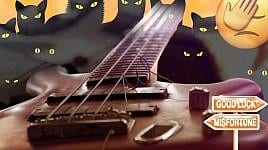
Being a singer and being able to perform songs is fun. But there are those moments on stage when the music has stopped and the silence needs to be filled. For some, these moments are not fun. Singing is very different from speaking – and working an audience is not the same as performing your songs. Sometimes these tasks are mistakenly lumped together. After all, there are a lot of pretty cool frontmen/women who do not say a syllable between songs.
If what you say on stage usually follows you around as a curse afterwards then maybe another, more eloquent band member should do the talking. But what do you do if you find yourself on stage alone, say, on a solo tour?
Here is a little guide with 9 tips for good, memorable stage banter!
1. It does not matter what you say, well, almost…
The most important information you communicate on stage is nonverbal. It comes down to your body language, whether you feel comfortable in your own skin, how you connect with your band members and how you handle mistakes. This shows your personality and creates more of a connection to the audience than the words you speak between songs.

2. Make notes / reminders / cue cards
Prepare yourself. Announcements do not have to be spontaneous, they should only appear that way. Grab a pen and ask yourself the following questions about the songs:
– What was the reason for writing this song?
– What is the core message of the song?
– What else could you say about the song? Funny anecdotes, the writing process, etc.
– What moves you when you sing the song?
Write down answers in keywords or short phrases. Then, as a second step, write a complete announcement. However, do not learn it by heart, use the keywords spontaneously instead to formulate a more natural announcement. This way the announcement is always a bit different and does not seem sterile or rehearsed. You also do not always have to include all the bullet points in the announcements. Look at it rather as a kind of base from which you can build.
3. Sets the cue for the beginning of the next song
A classic announcement trick is to mention of the title of the next song at the end of the announcement. This way your band knows the cue for when to start, otherwise the music might start at any moment and your speech will be cut off or awkwardly mixed with the intro of the song (sometimes this can be a nice effect, other times it can sound horrible).

4. Include daily (or strange) anecdotes
Sometimes it’s nice to talk about things that happened the same day or things that are currently happening. Patti Smith once told her audience about “Harvey the dragonfly” that she met the same day while on the toilet! Harvey was mentioned during all the other announcements of the evening. It sounds pretty crazy but it worked because the crowd thought it was hilarious!
5. What needs to be said?
Your band name, the current / new album, new songs, the new video, social networks, mailing lists, the next gigs, the merch stand. Think about the show, discuss with the band what the audience should know, write the points on a small piece of paper and stick it to the monitor box. This way if you forget to mention something maybe another band member won’t.
6. Remain authentic
Talk as you normally speak. Do not use any written language or terms that you would not otherwise say, unless you are playing a character or persona on stage. If you are performing in front of a foreign audience, it can be nice to say a sentence or two in their language. Crowds will appreciate the effort you’ve made to speak their language.

7. Where does the show need announcements?
Try to plan an overall schedule of announcements and songs. Which song needs an announcement? How long should it be, so as not to slow down the show? Or can you use an announcement to give you and your bandmates an opportunity to tune their instruments? Which songs can also be played directly after one another? The last song is normally announced, if the audience complains then you can mentally prepare to play an “encore” song or two.

\
8. What alternatives to classic announcements are there?
Let your imagination run wild. Some examples would be to use film / video projections or light shows as segues between songs or to compose short musical (maybe instrumental / atmospheric) interludes between the songs. Or a short theatrical performance might do the trick. The sky is the limit!

9. Practice makes for the best banter
As the saying goes, practice makes perfect. Here are three tips for you:
– Practice your announcements during band rehearsals. Invite friends for a mini concert to have the right audience. Record the show with your mobile phone and learn from your mistakes afterwards.
– Attend a theatre or public speaking course to learn improvisation and free speech. The cheaper option: Read articles about the topic.
– Watch others to see how they speak on stage and write down the things that could work for you. Of course, don’t imitate someone completely, adapt it to your personality instead. Inspiration is the keyword here.
Tell us about your onstage banter / announcement / speech experiences in the comments!
We’d love to read your suggestions and tricks too! ✍
3 comments
Leave a Reply
You are currently viewing a placeholder content from Facebook. To access the actual content, click the button below. Please note that doing so will share data with third-party providers.
More InformationYou are currently viewing a placeholder content from Instagram. To access the actual content, click the button below. Please note that doing so will share data with third-party providers.
More InformationYou are currently viewing a placeholder content from X. To access the actual content, click the button below. Please note that doing so will share data with third-party providers.
More Information





Matt says:
I think this comes down to charisma.
Not something that can be learnt. As stated some absolute icons have had the reputation of rarely uttering a word between songs and then you have the Freddie Mercuries of the world…
I personally find myself at ease with my own stage show and what I need to say to the audience.
I have found the more personable and vulnerable I make myself to the audience the more they respond.
The absolute key thing is to look at the audience when addressing them. In an almost viseral fashion.
You have to establish that primal heirarchy of performer to audience.
jkntrimmed says:
Do not tell jokes, not at least the same ones in every venue. At the age of YouTube even good jokes lose their point when everybody had heard them already.
Sometimes there are technical problems that take a long time to fix. It is good to practice some songs or instrumentals that you or your band can do and in extreme case acoustic (the audience will be quiet, believe me!) The songs can be covers, songs from your childhood or anything hilarious. The audience will love these kind of extras!
Remember to smile and laugh even when everything is messed up!
judydeerq says:
please send me more stuff